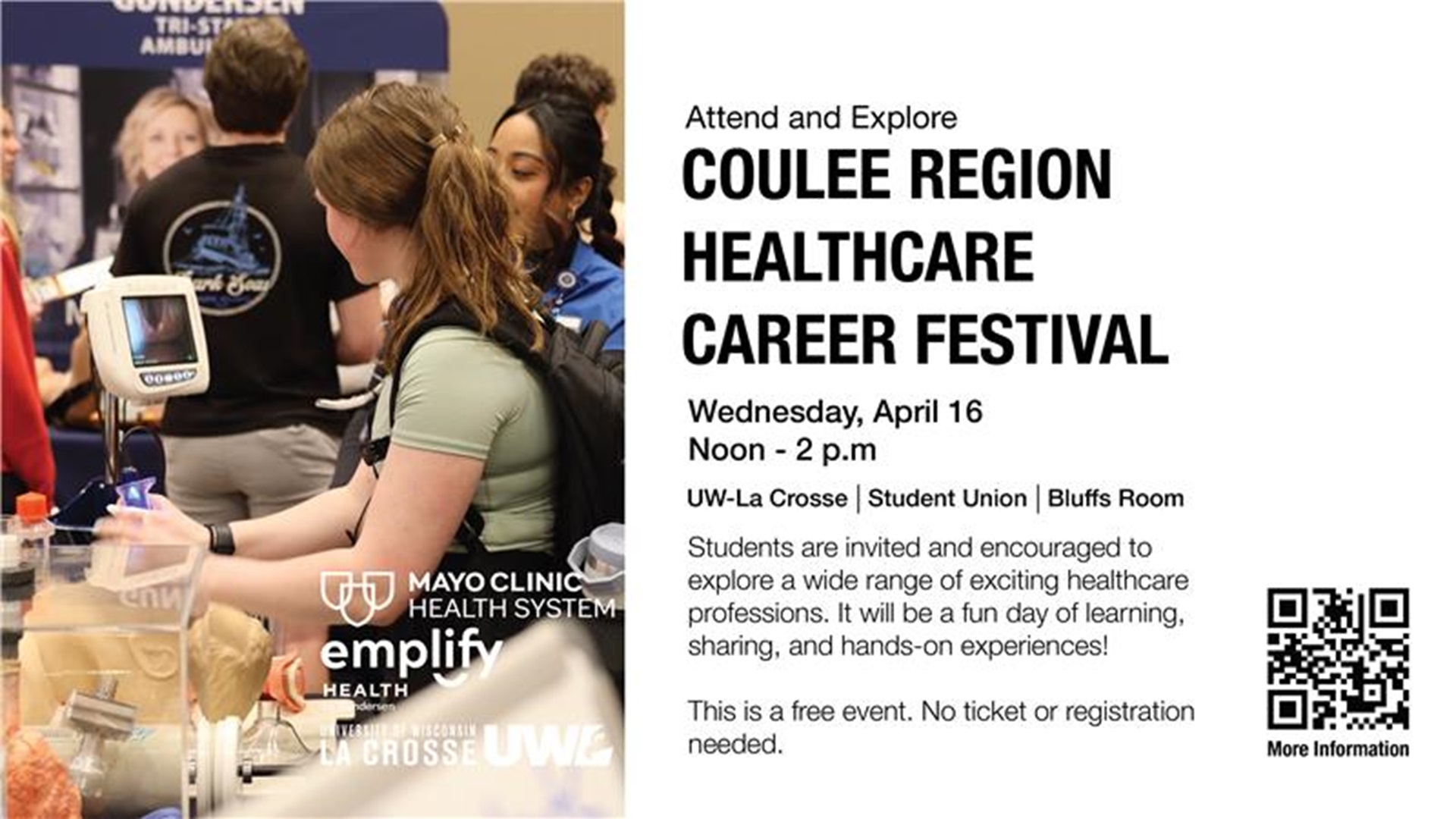Undergraduate programs
Biology
Undergrad major Undergrad minor Teacher license Graduate degree Doctoral degreeBiology is the study of all living things from microscopic bacteria and viruses to plants and animals. UWL's biology program is home to a wide variety of disciplines spanning from the molecular to the ecosystem level.
Areas of study
Aquatic Science Concentration
UWL offers an aquatic science concentration within the biology major to prepare students for exciting and challenging careers in the study and management of aquatic resources such as wetlands, streams, lakes, rivers, springs and groundwater.
Undergrad major View a sample plan for Aquatic Science Catalogfor Aquatic ScienceBiomedical Science Concentration
Biomedical science concentration coursework focuses on human and mammalian biology. An excellent choice for pre-med, pre-vet and pre-health professions students, the concentration includes a highly regarded, two-semester human anatomy and physiology series and additional chemistry classes.
Undergrad major View a sample plan for Biomedical Science Catalogfor Biomedical ScienceEnvironmental Science Concentration
Environmental Science concentration coursework includes strong core curriculum in biology, chemistry and math, followed by upper-level, environmentally relevant biology courses. Students with strong interests in the protection of natural resources and the outdoors tend to find this focus area appealing.
Undergrad major View a sample plan for Environmental Science Catalogfor Environmental ScienceScience Education
This is a teacher certification program, specifically for early adolescence-adolescence certification. All teacher education students must complete the general education, School of Education, major/minor, and university degree requirements in order to qualify for a degree. Biology requirements: 40 credits: (59-62 total credits including CHM and MTH requirements).
Undergrad major Teacher license View a sample plan for Science Education Catalogfor Science EducationMolecular Genetics & Cell Biology Concentration
Molecular Genetics and Cellular Biology concentration coursework focuses on understanding living processes at a molecular level. Scientists are making exciting biological discoveries in these fields today whether identifying genes responsible for cancer or re-writing the genetic code of living cells.
Undergrad major View a sample plan for Molecular Genetics & Cell Biology Catalogfor Molecular Genetics & Cell BiologyPlant & Fungal Biology Concentration
Plant & Fungal Biology concentration coursework will help you learn to identify plants and fungi, study their evolution, and understand their physiology. Students can also conduct research with faculty who study plants and fungi. UWL offers one of the only plant and fungal biology degrees in the U.S.
Undergrad major View a sample plan for Plant & Fungal Biology Catalogfor Plant & Fungal BiologyGraduate dual degree
The dual degree option enables a student to receive both a Bachelor of Science degree (biology major) and a Doctor of Physical Therapy degree from UWL. Students typically complete the undergraduate requirements in three years, followed by 34 months in the physical therapy graduate program. Students will be selected for entrance into the graduate program through a competitive application process. Participation in the dual degree program does not guarantee admission to the graduate program.
Undergrad major Graduate degree Doctoral degree View a sample plan for Graduate dual degree Catalogfor Graduate dual degreeFood & Nutrition Sciences
Undergrad majorFood science deals with how food is produced and received by consumers, from farm to fork. Nutrition examines how our bodies use the nutrients in foods we consume. Food systems bring these disciplines together to promote effective policies to sustainably feed the world enough nutritious food, while protecting the environment.
Nutrition
Undergrad minorNutrition is the study of nutrients in food and what they do for the body. Food and nutrition are an integral part of everyone’s daily lives and many factors influence how people choose the food they eat. In UWL's nutrition minor, students will learn about different aspects of food and nutrition, from individual nutrient needs, to the nutrient needs of specific groups, to how food is produced in a safe manner.
Graduate program
Biology
Graduate degree Whether you are interested in biomedical sciences, molecular biology, ecology, aquatic science, fungi, or behavior, you can find a great mentor at UWL.Areas of study















